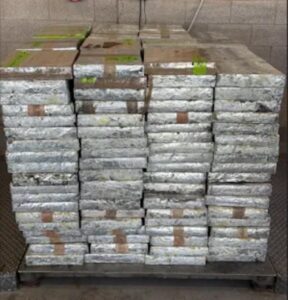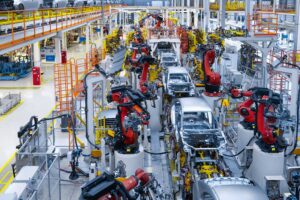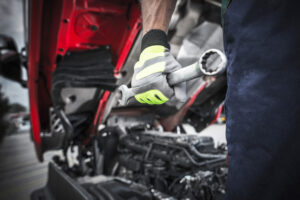SACRAMENTO, Calif. — Along with speeding tickets, truck drivers in California could soon have to worry about pollution tickets while traveling the state’s roads.
State regulators on Thursday will consider cracking down on heavy duty trucks weighing more than 14,000 pounds (6,350 kilograms) — those big semi-trailers that make up just 3% of all vehicles in California but spend so much time on the road they account for more than half of all pollution from cars and trucks each year.
The rules would require these big trucks — including ones from other states passing through California — to be tested at least twice per year to make sure they meet the state’s standards for particulate matter and ozone pollution. Passenger cars are already required to get smog checks.
Newer trucks have sensors on board that can monitor emissions and send data to the state. But regulators also plan to use roadside monitoring devices to catch trucks that pollute too much, along with automated license plate readers to identify the offenders. The state has two of these unattended monitoring devices in place and plans to install more. The devices resemble toll booths and capture a sample of the truck’s exhaust as it passes through without stopping.
Environmental advocates say the rule would be the most significant action in a dozen years to clean up California’s air, which consistently ranks among the dirtiest in the country. If enacted, state officials estimate the rules would prevent more than 7,000 premature deaths because of respiratory illnesses by 2050, avoiding more than $75 billion in health care costs.
“(The rules) have some significance for climate, but what we’re really talking about here is the smog and the particulate matter that is making people sick and killing people,” said Bill Magavern, policy director for the Coalition for Clean Air, a statewide advocacy group.
The proposal is one of a flurry of forthcoming changes that could dramatically reshape consumer and industry behavior in the nation’s most populous state that, were it an independent country, would have the world’s fifth-largest economy.
Also on Thursday, the California Air Resources Board will consider banning the sale of new products run by small gas-powered engines, including leaf blowers, lawn mowers and portable generators — a rule recently mandated by the state’s Democratic-dominated state Legislature. Next year, regulators are poised to tighten emission standards for barges, ferries, fishing boats and tugboats that line California’s coastal cities.
And, further down the road, regulators plan to ban the sale of all new gas-powered cars by 2035.
“These are the decisions we have to make if we’re serious about reducing our reliance on fossil fuels and leaving future generations with healthier communities,” said Assemblyman Marc Berman, a Democrat from Palo Alto who authored the law requiring the ban on new gas-powered lawn equipment.
While the new smog check rules for big trucks will have the largest impact on air quality — preventing more than 680,000 tons of smog by 2050 — banning the sale of new gas-powered lawn equipment will be the rule consumers notice the most.
Car engines have advanced over the years to pollute less. But the small engines that power most lawn equipment haven’t made as much progress. State regulators say the amount of pollution that comes from running a gas-powered leaf blower for one hour is comparable to driving a gas-powered car about 1,100 miles (1,770 kilometers) — or roughly the distance between Los Angeles and Denver.
“Nobody will have to give up or stop using equipment they already own. The force of this regulation falls on manufacturers,” Berman said.
The rules would have the biggest impact on professional landscapers, who rely on gas-powered equipment to do multiple jobs per day. California lawmakers included $30 million in the most recent state budget to assist these companies converting to battery-powered equipment. But on Thursday, some landscapers testified that equipment would not be as reliable.
Trucking companies and small engine manufacturers have mostly complained about how fast these new standards would imposed. Both the smog check rules for trucks and the ban on the sale of new gas-powered lawn equipment would be fully implemented by 2024, while a similar bans sales of new gas-powered generators would take effect in 2028.
Chris Shimoda, senior vice president for government affairs with the California Trucking Association, said the industry is suffering from a shortage of drivers and parts because of global supply chain disruptions. He said one sensor that measures diesel exhaust fluid that normally costs around $300 now can cost $7,000 or more.
“We just want to make sure that, again, anybody experiencing those sort of issues is not left high and dry,” Shimoda said.
Jeff Coad, vice president for marketing and product management for the small engine manufacturer Briggs & Stratton, said the company is ambivalent about how their products are powered but said it won’t have enough time to fully comply.
“Converting a product such as a large zero turn mower from gas to lithium battery power is not just a matter of replacing the engine with the battery,” he said, adding the development time can take up to two years.
Liane Randolph, chair of the California Air Resources Board, said the state is sensitive to those concerns, adding that regulators do a careful analysis of both the costs and the health benefits of any proposed rule.
“These regulations result in less trips to the emergency room, less long-term health impacts, and, frankly, less medical costs for the community,” she said.
The Associated Press is an independent global news organization dedicated to factual reporting. Founded in 1846, AP today remains the most trusted source of fast, accurate, unbiased news in all formats and the essential provider of the technology and services vital to the news business. The Trucker Media Group is subscriber of The Associated Press has been granted the license to use this content on TheTrucker.com and The Trucker newspaper in accordance with its Content License Agreement with The Associated Press.








it will push prices even higher….already highest inflation in 40 years…the end of middle income americans is near